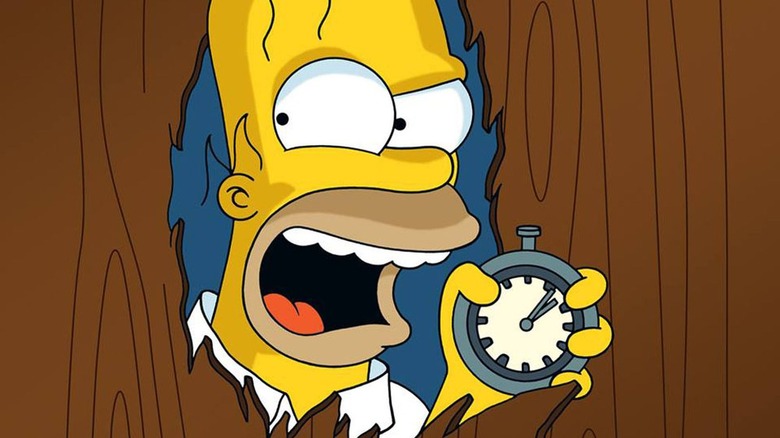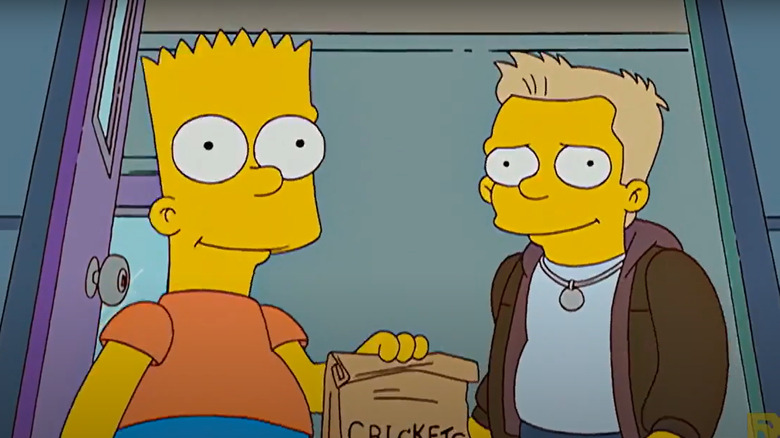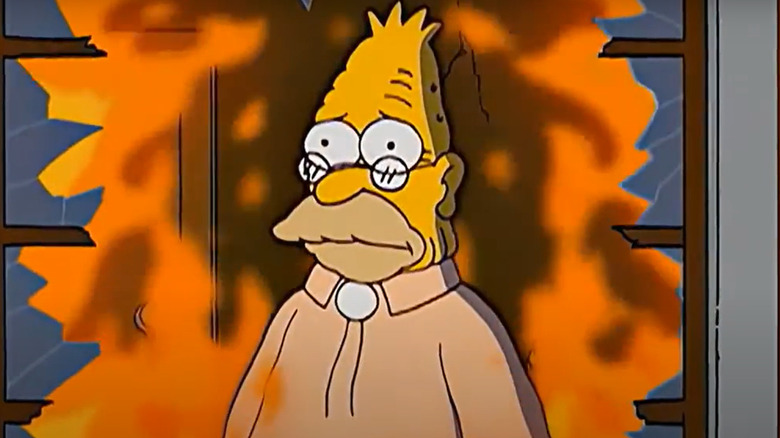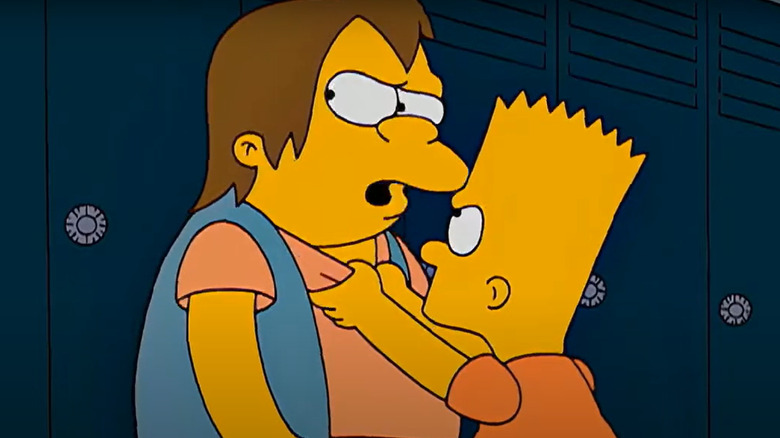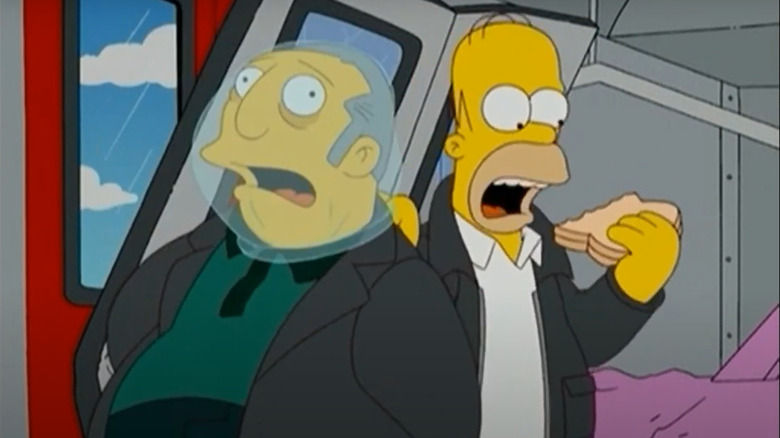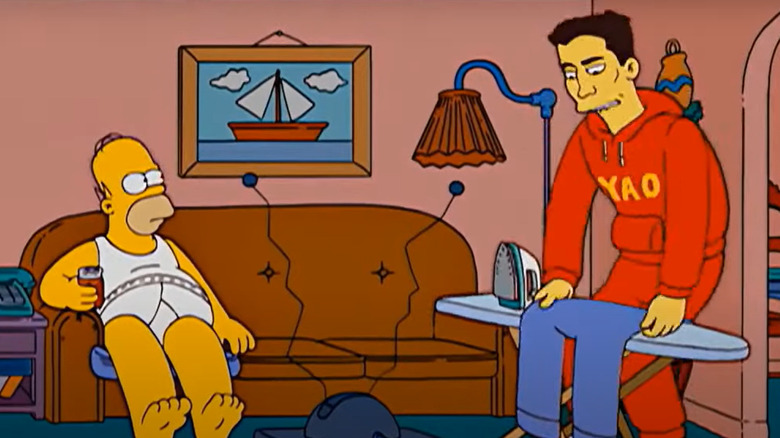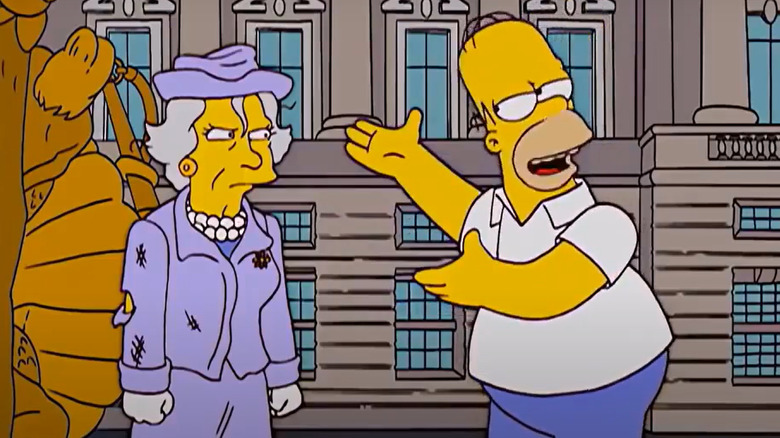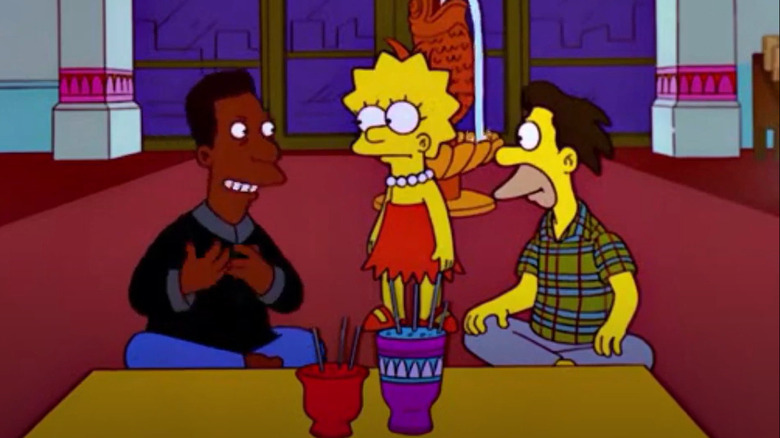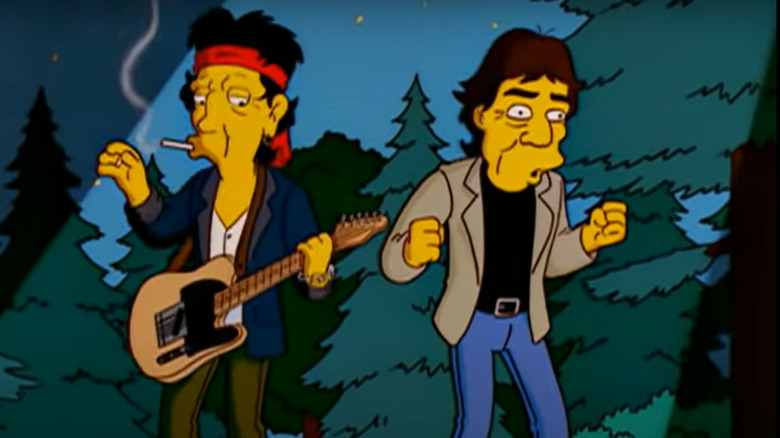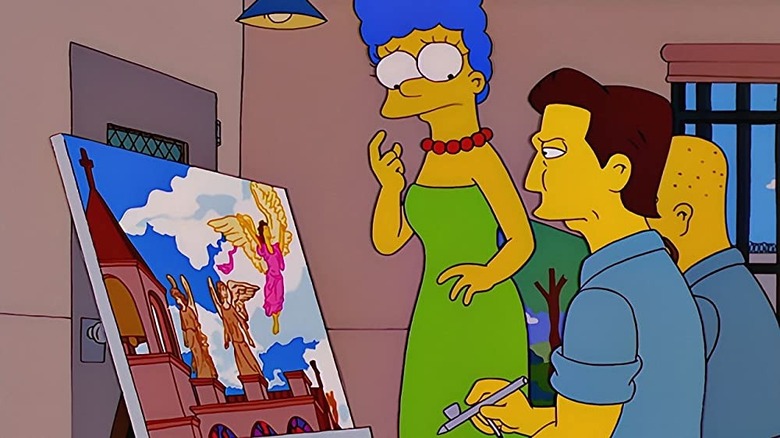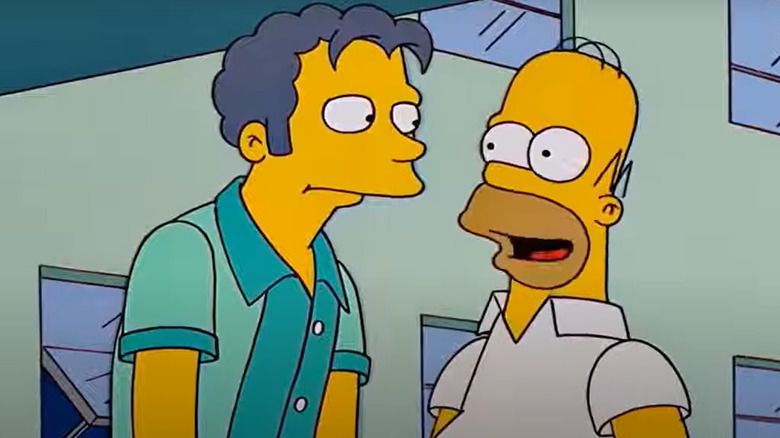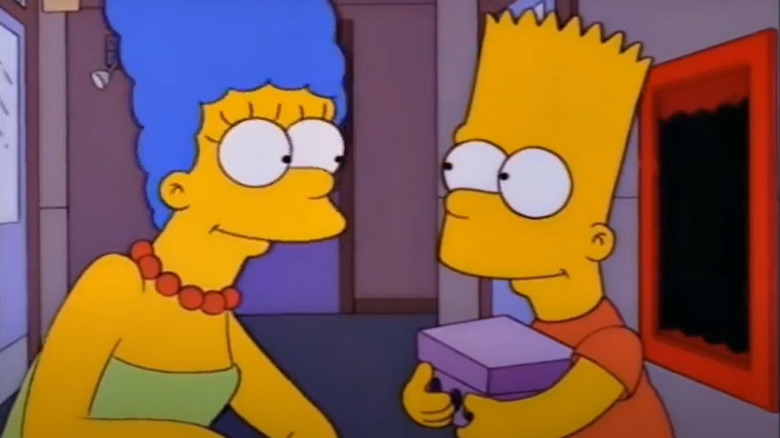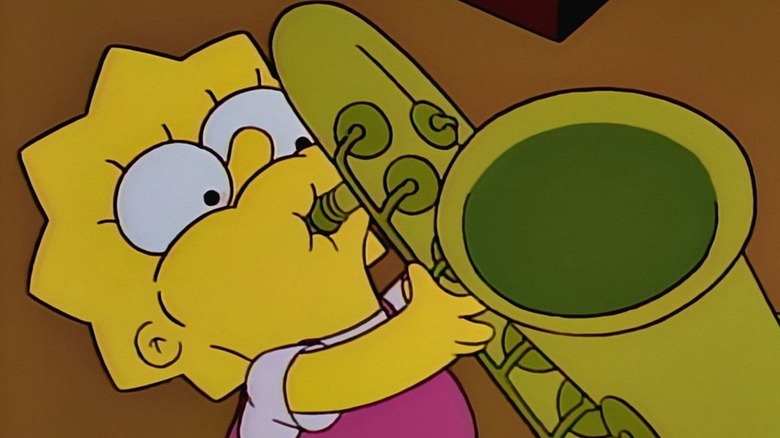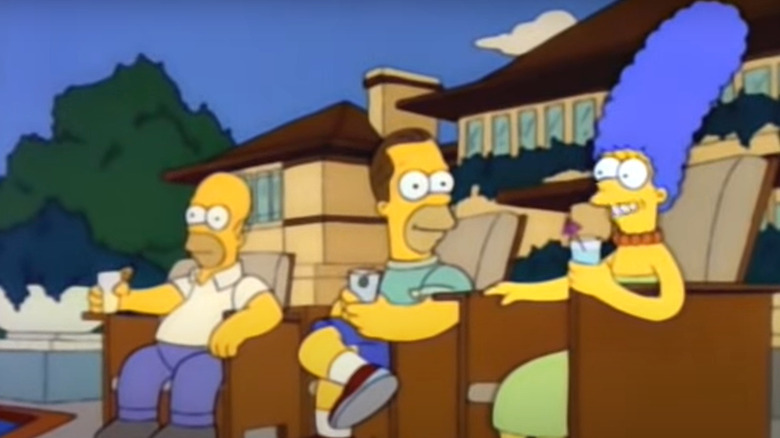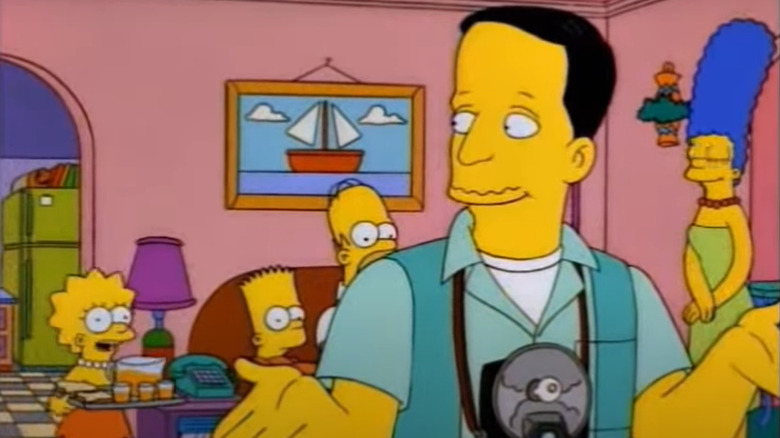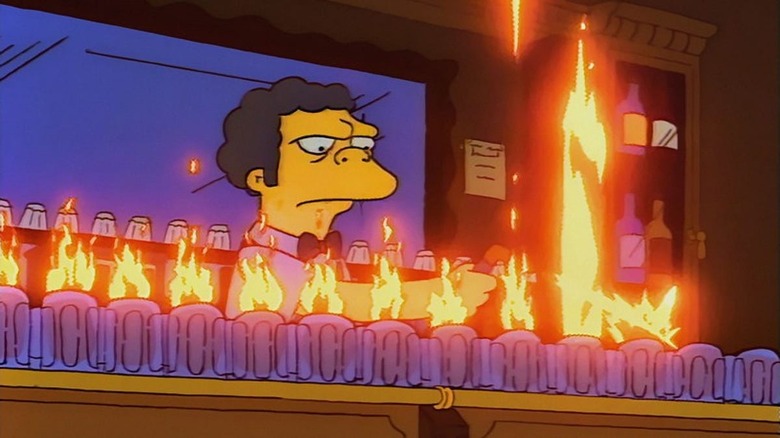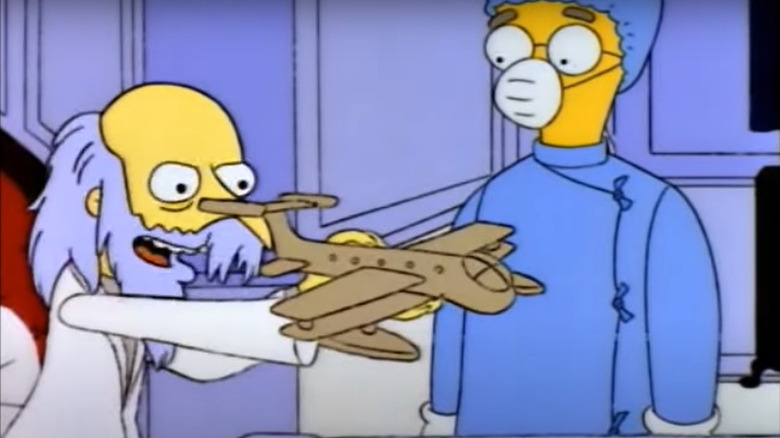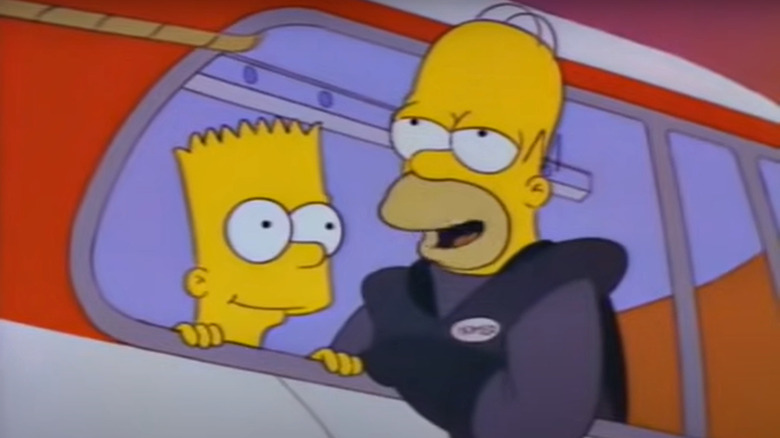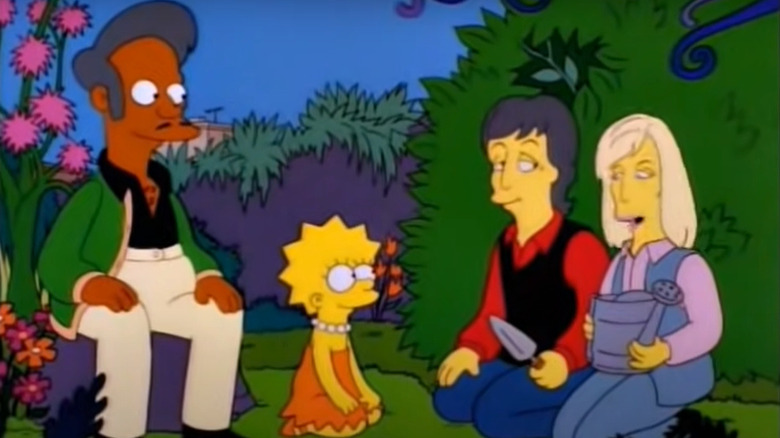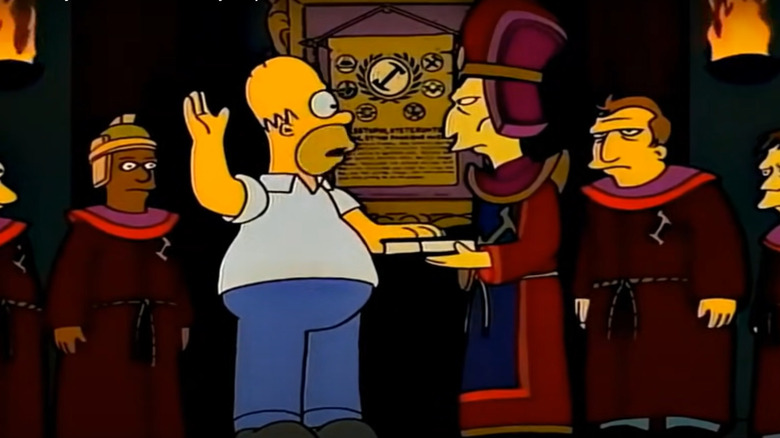The 20 Best Seasons Of The Simpsons Ranked
"The Simpsons" is less of a TV show and more a force of pop-cultural nature. While the series has undergone many changes over the years and decades, it has never lost its perfect balance of satire, humor, and heart. Homer, Marge, Lisa, Bart, and Maggie have embarked on countless (mis)adventures, and yet audiences have never gotten tired of seeing the Simpson family stick together through all of the zaniness. What started off as a fun animated program about a wacky family that poked fun at sitcom cliches has since become a massive franchise whose influence can only be measured in terms of megatons, which is not surprising considering how long and with how many episodes "The Simpsons" has been entertaining us.
As of this writing, the series has now tallied more than 720 episodes spread out over 30 seasons and has the unique distinction of being the longest-running sitcom in the U.S. That's not bad for something that got its start as animated short segments on "The Tracey Ullman Show" in 1987. Let's not forget about the hit 2007 film, either. While the popularity of "The Simpsons" has dwindled throughout its history, it's still going strong. Some mediocre seasons are to be expected for a series that has lasted this long, but overall the show has an incredibly strong legacy consisting of far more acclaimed seasons than middling ones. Let's take a look at the best seasons of "The Simpsons," ranked according to IMDB.
20. Season 19
One of the few bright spots of this season is the spoof of "The Departed" (called "The Debarted") about Principal Skinner and Superintendent Chalmers recruiting a young boy to dupe Bart into thinking he's a fellow prankster, only to snitch on him at every turn. Things get complicated when Groundskeeper Willie tells Bart that there's someone in his group who's ratting them out to the school authorities, with Bart thinking it's Milhouse, who he plays a mean prank on in retaliation.
However, this season gets some points knocked off for the infamous episode "That '90s Show," which needlessly replaced so much of the Simpson family's history and placed Marge and Homer's initial romance in the 1990s. Audiences and critics alike were rightfully confused and bothered by the strange choice of putting a young Homer in a rock band that parodied Nirvana, and how the wraparound story felt so contrived. Not even appearances from Kurt Loder and "Weird Al" Yankovic as themselves could rescue this stinker.
19. Season 17
Season 17 doesn't go over and beyond with the laughs or originality, but it should be lauded for at least giving some extra attention to side characters. "Million Dollar Abie" is a Grandpa-centric episode, chronicling his blowing Springfield's chances of becoming the home for a professional football team. Feeling down after everyone in town hates him, he gets a new lease on life by becoming a matador. The plot is kind of all over the place, but it features some laugh-out-loud moments and fleshes out the relationship between Grandpa and Lisa.
"Treehouse of Horror XVI" continues "The Simpsons"' tradition of spoofing popular horror properties: "B.I. Bartificial Intelligence" has the Simpson family replacing Bart with a superior android son; "Survival of the Fattest" finds Homer and others going to Mr. Burns' property to do some hunting, only to be hunted by Mr. Burns himself; and "I've Grown a Costume on Your Face" has Springfield hosting a costume contest that goes awry for everyone in town.
18. Season 18
Season 18 doesn't have a whole lot going for it, but it does have some killer celebrity appearances. "The Mook, the Chef, the Wife and Her Homer" was written by comedy legend Bill Odenkirk, and featured appearances from Metallica, Joe Mantegna, Joe Pantoliano, and Michael Imperioli. This fairly serviceable sendup of gangster movies follows Lisa as she befriends Fat Tony's young son, Michael, who has dreams of becoming a professional chef instead of joining his father's criminal lifestyle. While nothing too special, this episode has some good laughs and includes a hilarious homage to the ending of "The Godfather."
The real standout episode of Season 18, though, is "24 Minutes," a parody of the hit show "24," which even features Kiefer Sutherland and Mary Lynn Rajskub reprising their roles as Jack Bauer and Chloe O'Brian, respectively. The episode follows Lisa and her CTU — Counter Truancy Unit — as they recruit Bart to help them prevent the school bullies from setting off a stink bomb at a bake sale, featuring all the high stakes of a typical episode of "24." Another one of the better episodes of this season is "The Haw-Hawed Couple," which is about Bart becoming Nelson Muntz' best friend. While there are numerous benefits to being friends with the school bully, it does come with some downsides. Because Nelson has never had a best friend before, he gets extra jealous when he finds out that Bart had been playing with Milhouse behind his back.
17. Season 20
Season 20 of "The Simpsons" is a pretty important one for the show, as it was when they tied with the "Gunsmoke" record of most seasons on the air. Unfortunately, despite a few good episodes, this season isn't remembered for much more than its milestone. The season opener, "Sex, Pies and Idiot Scrapes," is a standout, following Homer who — inspired by his recent stint in jail — decides to become a bounty hunter and brings along Ned Flanders for some hijinks. The episode also features Marge working at an erotic bakery, which shocks her more traditional sensibilities but she agrees to stay on when told she has a special talent for baking.
"Homer and Lisa Exchange Cross Words" does a nice job crossing two different storylines: Lisa becomes addicted to crossword puzzles and even participates in a crossword puzzle competition, while Homer makes big bucks breaking up couples ... only to get out of that business when he has nightmares about angry exes. So how do these two plots meet? Homer, noticing Lisa's wins at the crossword competition, bets the money he made from breaking up couples on Lisa which pays off big time. However, when Lisa begins to falter, Homer decides to bet on her opponent, much to Lisa's annoyance. However, this episode does a nice job harking back to that classic feel-good era of "The Simpsons."
16. Season 16
"Homer and Ned's Hail Mary Pass" parodies "The Passion of the Christ" when Ned Flanders makes some brutally violent yet extremely accurate films based on the Bible. The B-story has Homer gaining notoriety for a victory dance he did at a carnival, and when he gets hired to do a Super Bowl halftime show he teams up with Ned to incorporate some Christian elements, much to the chagrin of hardcore football fans. The Simpsons' world gets a shakeup in "There's Something About Marrying" when Homer becomes a minister with the "e-Piscopal" Church just so he could make money marrying gay couples. However, this episode is actually pretty important, as it deals with Marge's sister Patty admitting that she's a lesbian.
Marge has trouble dealing with this revelation, which damages their relationship but she ultimately comes around to accepting her sister's sexuality. "Future-Drama" gives the audience yet another look at a possible future for the Simpson family in the distant year of 2013. This timeline follows Lisa and Bart as they're about to graduate from high school and having troubled romantic lives. However, they're not the only ones having relationship woes, as Marge has left Homer when he spent all of their money on an undersea home and is now going out with Krusty the Clown.
15. Season 15
While Season 15 isn't without some solid episodes, it was also proof that "The Simpsons" had lost much of its originality and was firmly in a more straightforward direction. A high point for the season was "The Regina Monologues," which saw the Simpson family head to London on the insistence of Grandpa, who wants to look up a woman he once hooked up with during his time in World War II. Of course, this being "The Simpsons" the episode isn't a travelogue and it isn't long before Homer crashes into the horse-drawn carriage of Queen Elizabeth II and is considered for execution.
The writers behind "The Simpsons" have fun with history in "Margical History Tour," which has a wraparound storyline about Marge giving botched history lessons to Bart, Lisa, and Milhouse when they discover that the library has gotten rid of most of their history books. Homer plays King Henry VIII (which of course features him singing "I'm Henry the Eighth, I am"), Lenny and Carl play Meriwether Lewis and William Clark, respectively, and the film "Amadeus" is referenced with Lisa as Salieri and Bart as Mozart.
14. Season 13
One of the high points of this season is "I Am Furious (Yellow)," marked by a wonderful cameo from comic book legend Stan Lee. Bart gets inspired to create a comic book character based on Homer called "Angry Dad" which goes viral when it gets turned into a web cartoon, causing Homer to "hulk out" in his own way when he discovers he's been turned into a laughing stock. The episode makes some charming references to superhero lore, and also delivers a stinging jab at the dot-com bubble.
While the sweet side of "The Simpsons" had been in gradual decline by this point in the series, "She of Little Faith" was a welcome return to that classic heartwarming era of the show. In it, Lisa becomes bothered with how the local church has gone so commercial and decides to take up Buddhism, with some guidance provided by Richard Gere. Lisa's family, however, aren't too happy with Lisa's change of faith and turn to Reverend Lovejoy for help, who suggests bribing Lisa back to Christianity with Christmas. The episode deals with faith in a pretty thoughtful way while also delivering plenty of laughs. One of the less stellar episodes of the season is "The Bart Wants What It Wants," which features Bart going out with Rainier Wolfcastle's daughter, Greta. It's got some funny moments, but the absurdity was getting to be a bit much during this era of the show.
13. Season 14
One of the most memorable "Simpsons" episodes of Season 14 was "How I Spent My Strummer Vacation," which sees the Simpson family send Homer to a Rock 'n Roll Fantasy camp after they see him rant about how much they annoy him on TV. Not only does it feature a hilarious premise, but the episode also includes a bevy of rock star cameos including Mick Jagger and Keith Richards of the Rolling Stones, Lenny Kravitz, Elvis Costello, Tom Petty, and Brian Setzer.
Kelsey Grammer returns as Sideshow Bob in "The Great Louse Detective," when the character is ordered by Chief Wiggum to live with the Simpson family to help them discover who's been trying to assassinate Homer. Spoiler alert: it's Frank Grimes, Jr., the son of Homer's enemy who died while futilely trying to prove to the world how stupid Homer is. It's a pretty hilarious callback to a classic episode, and seeing Bart forced to live with his archnemesis is a blast as well. However, one of the season's low points is "A Star Is Born Again," in which Ned Flanders strikes up a relationship with a famous actress who is charmed by his old-fashioned ways. While Marisa Tomei makes a great addition as the actress, the episode feels rushed and Ned's actions feel out of character.
12. Season 12
"The Simpsons" getting into the double-digit seasons may have signaled the decline in quality for the series, but at least it was a slow decline, which meant that Season 12 is still very watchable. "HOMR" perfectly maintained that classic balance of whimsy and heart, with Homer learning that the cause of his lackluster intelligence was a childhood incident that ended with a crayon crammed up his nose into his brain. Once he had it surgically removed, however, his smarts returned, which meant that he got to bond with Lisa for once. Another high point for the season was "Skinner's Sense of Snow," in which Springfield Elementary gets snowed in during a storm, and so the kids depose Principal Skinner and take over the school.
"Pokey Mom" sees Marge return to her passion for painting by teaching an art class in prison, where she meets the convict Jack (voiced by Michael Keaton), who's particularly gifted and gets invited to live with the Simpson family when he's released. Things take a turn for the paranoid in "The Computer Wore Menace Shoes," which follows Homer as he starts a website that peddles made up gossip and conspiracy theories, only for one of those theories to turn out to be true.
11. Season 11
Homer gets lots of love this season with plenty of episodes focused on the big lug. It's a dream come true for Homer in "Guess Who's Coming to Criticize Dinner?" when he gets paid to eat at restaurants as a food critic (with Lisa writing the actual reviews, of course), but becomes the target of an attempted assassination when his negative reviews arouse the ire of Springfield's chefs. "E-I-E-I-(Annoyed Grunt)" has Homer take his family to live on the farm he grew up on, where he mixes tobacco seeds with tomato seeds to create the highly addictive "tomacco." In "Hello Gutter, Hello Fadder," Homer achieves some local notoriety when he bowls a perfect 300 game, but must contend with being seen as a flavor of the month.
Luckily, Homer leaves room for other characters to get the spotlight this season. Moe gets plastic surgery in "Pygmoelian," which leads to him getting the starring role in a soap opera, and Lisa learns tap dancing from a deranged former child star in "Last Tap Dance in Springfield." However, this season is marred by the death of Maude Flanders in "Alone Again, Natura-Diddily," which not only tries to cram too much story into a single episode but also feels like a contrived way to change up the status quo of the show.
10. Season 10
Around this time in "Simpsons" history, the show began to lose some of its sentiment and focus more on outlandish gags and plotlines ... not that we think that's necessarily a bad thing. Season 10 has plenty of great episodes and is still far from its worst. However, because the show's creators during this period were more willing to sacrifice warmth for pure zaniness, the characters started to become a little less relatable.
One episode that didn't skimp on the schmaltz is "Bart the Mother," which does a nice job of fleshing out the relationship between Bart and Marge. This episode is also notable for being the final appearance of the late Phil Hartman. The plot for "When You Dish Upon a Star" was a tad unimaginative: Through a parasailing accident, Homer discovers the secret vacation home of then-married Alec Baldwin and Kim Basinger, leading to the couple hiring him as their assistant. Ron Howard joins in on the fun, as well as a brief appearance from real-life producer Brian Grazer. While the story could've used some more work, the celebrity guest stars made for some hilarious scenes.
9. Season 1
Watching the inaugural season of "The Simpsons" today is an almost completely different experience from watching the show in its current form. The voices sound different (despite being provided by the same actors), the animation is rough compared to the modern polished style, and there's a lot more emphasis on character than gags and pop culture references. It's still a marvel how well-formed the show was when it first aired in 1989, and how many elements it introduced that have since become staples of the show for the following 30+ years. It's obvious that Matt Groening and company had a clear vision in their heads of how the show would look and the type of humor it had before that debut episode hit the small screen.
Speaking of the debut episode, "Simpsons Roasting on an Open Fire" was an auspicious start for the series. It saw the family struggling with financial issues around Christmastime, prompting Homer to get a second job as a department store Santa Claus. When that doesn't work out, he goes to the dog track for one last chance to make some money. That too fails, but he does return home with a new family member, Santa's Little Helper.
8. Season 9
Lisa shines in Season 9 with several great episodes focused on her. "Lisa's Sax" is another strong flashback episode, this time telling the charming story of how a young Lisa first got her saxophone and fleshes out the heartwarming relationship she has with Homer. "Lisa the Skeptic" follows Lisa as she tries to prove to the people of Springfield that a recently-excavated human skeleton with wings isn't an angel. The Simpson family makes their way to the Big Apple in "The City of New York vs. Homer Simpson," where Barney left Homer's car months earlier when he let him borrow it.
"Das Bus" is a hilarious sendup of "Lord of the Flies" in which the kids of Springfield Elementary find themselves trapped on a deserted island and quickly turn into savages, all while Homer tries to start an internet company without any discernible technology. While Season 9 has plenty of great things to offer, it's unfortunately marred by the infamous "The Principal and the Pauper," wherein it's revealed that Principal Seymour Skinner is an imposter who took over the life of the real Seymour Skinner when he thought he died in the Vietnam War. It was a shocking revelation that was extremely forced but was retracted by the end of the episode, making it all nothing more than a cheap attempt to shake things up.
7. Season 2
During this era of "The Simpsons," the show was still fairly grounded and largely consisted of believable storylines. While there were still some aspects that needed polishing, Season 2 was a considerable improvement on the inaugural season and featured a ton of heart that's been largely missing in later seasons. Because of Bart's immediate popularity, there were several episodes that focused primarily on him. Notable among these episodes is "Bart Gets an 'F'" which sees Bart's constant failures in school put him in jeopardy of repeating the fourth grade, and so he reaches out to class genius Martin Prince (marking the character's series debut) for help.
Homer's side of the family is explored in "Oh Brother, Where Art Thou?" which features Danny DeVito voicing his long-lost half-brother Herbert 'Herb' Powell. Dustin Hoffman guest stars in a moving episode as Lisa's substitute teacher Mr. Bergstrom, on whom she develops a crush. While the show was still in its relative infancy, it still managed to snag a cameo from a Beatle (namely Ringo Starr) in the episode "Brush with Greatness," which gives Marge a time in the spotlight as she explores her artistic side. Season 2 is also important for serving as the launchpad for several characters who would go on to become major fixtures in the show, including Maude Flanders, Nick Riviera, Hans Moleman, Julius Hibbert, Comic Book Guy, and Snake Jailbird.
6. Season 8
Perhaps the biggest highlight of Season 8 is "Homer's Phobia," which saw Homer cut ties with a friend the family (played by John Waters) just made when he found out that he was gay. He lets his insecurity get the better of him when he begins to think Bart is gay, too. This, of course, blows up in Homer's face when he and his friends are saved by his former gay friend. While pretty quaint now, the episode was a milestone when it aired in 1997 for the humorous yet thoughtful way it discussed homosexuality.
There were other classic episodes from this season, including "You Only Move Twice" where the Simpsons move to the seemingly perfect town of Cypress Creek to accommodate Homer's new job working for (unbeknownst to him) a megalomaniacal madman. "Homer's Enemy" introduced us to Frank Grimes, the incredibly industrious new employee at the nuclear power plant whose mind is constantly boggled by everyone else's obliviousness to Homer's stupidity. Season 8 could almost be at the top of this list for the episode "Homer vs. the Eighteenth Amendment" alone. This one has Springfield enacting prohibition, leading Homer to become the town's "Beer Baron." Each character is pitch-perfect, every joke lands, and it has maintained its freshness even decades later.
5. Season 3
While there were still some rough edges around "The Simpsons" in Season 3, so many classic elements had been crystallized by this point that it still holds up remarkably well today. The show was also big enough to attract more and more massive celebrities, including the King of Pop himself Michael Jackson in "Stark Raving Dad," voicing a large white mental patient who claimed to be Michael Jackson. "Flaming Moe's" sees Homer fashion a cocktail made of children's cough syrup and fire that Moe takes credit for, turning his tavern into the town's hottest joint. Even Aerosmith does a show there!
Many music icons appeared on "The Simpsons" during this season. Sting appears as himself in "Radio Bart," and even Spinal Tap stops by in "The Otto Show." However, it's not just the celebrity guests that make Season 3 so great, as there are also plenty of great storylines here. Fat Tony makes his first appearance in the terrific "Bart the Murderer," which has Bart joining the local mafia. We're treated to more of Lisa's mature side in "Mr. Lisa Goes to Washington," and Milhouse gets a girlfriend (straining his relationship with Bart) in "Bart's Friend Falls in Love."
4. Season 5
Seeing as how embracing a wackier approach to storytelling worked so well for the previous two seasons, "The Simpsons" pushed the envelope a little further for Season 4 but still managed to deliver top-notch gags and character work. "Deep Space Homer" has NASA sending Homer into space as part of an initiative to increase viewership of their launches. Real-life astronaut Buzz Aldrin accompanies Homer where no Simpson has gone before, and musician James Taylor joins in on the fun. Conan O'Brien penned the hallowed "Homer Goes to College," and even contributed to "Treehouse of Horror IV." Everyone's favorite hillbilly Cletus makes his first appearance in "Bart Gets an Elephant," while the Rich Texan debuts in "$pringfield."
During this era, the creators behind "The Simpsons" really knew how to incorporate pop culture references into a story without being too ostentatious about it. For example, "Homer's Barbershop Quartet" does a wonderful job taking jabs at The Beatles while also telling a fascinating story from Homer's early days ... and of course, George Harrison appears as himself. "The Simpsons" even takes on Martin Scorsese's then-recent remake of "Cape Fear" in an episode that welcomes back Sideshow Bob in yet another one of his attempts to kill Bart.
3. Season 4
By the time Season 4 aired, the cast and crew behind "The Simpsons" had pretty much worked out all of its formative kinks, and thus the show matured into a veritable masterpiece beloved around the world. No conversation about Season 4 would be complete without mentioning "Marge vs. the Monorail," written by Conan O'Brien. The episode had the always-welcome voice of Phil Hartman as Lyle Lanley, a sleazy yet charismatic salesman who tricks Springfield into building a poorly-made monorail. While Springfield's citizens don't always make the best decisions (like constantly voting for Mayor Quimby), nobody could blame them for falling for Lanley's catchy tune, "The Monorail Song."
"Marge vs. the Monorail" is often seen as a turning point for "The Simpsons" as the series began to adopt wackier and wackier scenarios, which have since become their signature style of humor. "Krusty Gets Kancelled" saw Krusty the Clown's show taken off the air only for him to make a valiant rebound with the help of fellow entertainers Johnny Carson, Luke Perry, Bette Midler, Hugh Hefner, and the Red Hot Chili Peppers (all played by their real-life counterparts). The season also has another fan-favorite episode, "Last Exit to Springfield," which follows Homer as he becomes the head of the nuclear power plant's union in a bid to restore the workers' dental plan so that Lisa can get braces.
2. Season 7
The seventh season of "The Simpsons" got off to a strong start with the second part of "Who Shot Mr. Burns?" For those of you still wondering after more than 25 years, it was Maggie. This season also saw the show up the ante in terms of celebrity cameos, with "Lisa the Vegetarian" including an appearance by Paul and Linda McCartney. "Mother Simpson" was a wonderfully touching episode, as it saw Homer meet his mom after she went on the run from the law decades earlier, featuring Glenn Close as the missing matriarch. Kelsey Grammer returned as Sideshow Bob for another failed attempt to kill his nemesis Bart in "Sideshow Bob's Last Gleaming."
Beloved character Disco Stu made his debut in "Two Bad Neighbors," which saw Homer square off against former President George H.W. Bush. "Homerpalooza" was a music lover's dream, as it featured appearances from Peter Frampton, Cypress Hill, The Smashing Pumpkins, and Sonic Youth. Who could forget the terrific parody of "Pulp Fiction" with "22 Short Films About Springfield," highlighting the unusual lives of various side characters? That episode is most famous for its "Steamed Hams" segment which has become a popular meme in recent years.
1. Season 6
At the top of our list we have Season 6, a veritable "greatest hits" of classic "Simpsons" episodes, each filled to capacity with amazing character moments and gags. "Homer the Great" saw Homer accidentally become the leader of the exclusive clandestine club the Stonecutters, whose members leave when Homer tries to steer them in a more altruistic direction. "Lemon of Troy" told the story of how Bart and his friends snuck into nearby Shelbyville to take back Springfield's fabled lemon tree. We even got a glimpse of a possible future in the surprisingly touching "Lisa's Wedding."
One of the more notable episodes of Season 6 was its cliffhanger finale, "Who Shot Mr. Burns? (Part One)." What could've been a sleazy attempt to boost ratings ended up becoming a classic moment in "Simpsons" history. To capitalize on the mystery numerous promotions were held, including the release of "Springfield's Most Wanted," a hilarious sendup of "America's Most Wanted" that even featured the show's host John Walsh. Because "The Simpsons" was so popular at this point, all these promotions did was get fans even more excited for the following season to find out if their theories were true. This season also had a terrific "Treehouse of Horror" installment, which included a hilarious spoof of Stanley Kubrick's "The Shining" titled "The Shinning" (to avoid getting sued, according to Groundskeeper Willie). The episode even featured a one-line cameo from James Earl Jones, voicing Maggie from another dimension.
